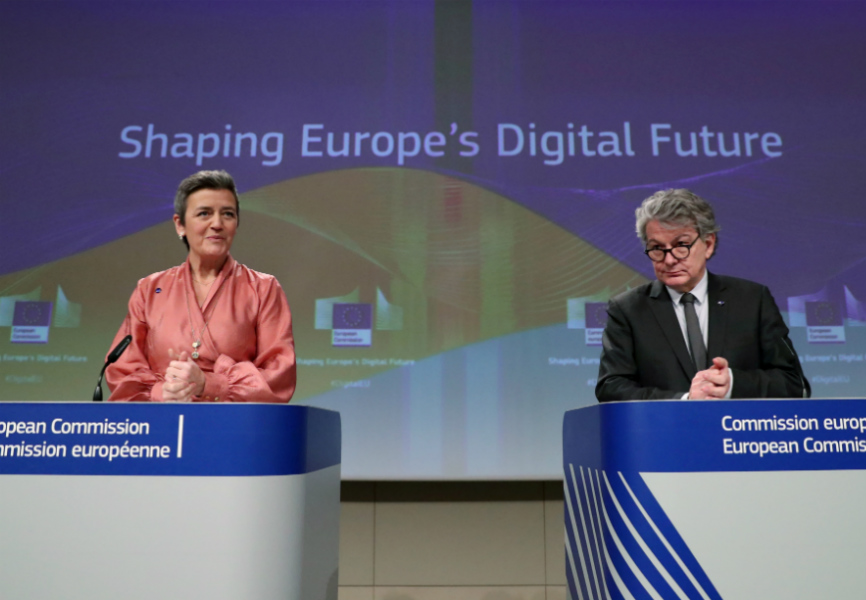Less than three months after being sworn into office, the cabinet of European Commission President Ursula von der Leyen released on Wednesday ambitious plans for the EU to regulate Big Tech going forward, specifically when it comes to artificial intelligence, internet “platforms,” and data usage. While the proposals still have a way to go before becoming European law, they sent an unmistakable message to Silicon Valley, the US, and China—Europe matters, and can make your life difficult … at least when it comes to tech.
Why it matters:
Europe has long been a trailblazer when it comes to digital rights; the European Court of Justice has been issuing decisions for the “
right to be forgotten” since 2014. This continued with Europe's
General Data Protection Regulation (GDPR) in 2018, the most extensive data privacy framework in the world. Though GDPR was designed to protect European citizens specifically, the number of international companies that operate in Europe meant that Europe's approach to data privacy became adopted as the de facto global standard as companies found it cheaper to simply comply with Brussels across international markets. The EU is hoping to replicate that success with these new regulations.
Standing on this side of 2020, it's clear that Europe is a true regulatory superpower. What it is not, however, is a tech superpower, or for that matter any other kind of superpower using traditional metrics of geopolitical strength. Europe doesn't have the Silicon Valley tech titans in its corner and doesn't have the state-control of capitalism to grow its own tech champions the way that Beijing has done in recent years. It also increasingly finds itself caught between Washington and Beijing's will-they-or-won't-they Cold War. Tech regulation represents Europe's best hope for resuscitating its geopolitical relevance in the 21st century. For more about Europe's attempts at geopolitical revival, be sure to check out Eurasia Group's Top Risk #6 for 2020:
Geopolitical Europe.
What happens next:
The proposals issued yesterday were an ambitious start but only a start. For the next three months, Brussels will await and gather reactions from countries, companies, and other interested parties before they begin the process of drafting laws.
So what exactly was unveiled this week? Three separate documents, actually—the first a white paper on AI which proposes a rigorous framework under which “trustworthy” AI tech can both be developed and deployed across the EU, with a particular emphasis on “high-risk AI,” or AI that has the possibility to violate a person's individual rights, like facial recognition. The EU wants to boost its own capabilities in AI while turning its strong tech regulation into a competitive advantage: for consumers already wary of how big Silicon Valley or Chinese companies are, AI made in Europe is a product they can trust. GDPR already has some protections in place for this kind of technology, but the aim is to flesh out and develop more specific regulations.
As for the use of digital data, the goal is to provide European entities (whether they are companies, researchers, or government agencies) with a “single market for data” for them to access and use for their own tech and AI developments. The EU doesn't have the same scale of giant tech firms that lord over massive data sets like the US and China. It wants to encourage companies that currently have access to data to share it with other tech players in hopes of developing a thriving European tech sector that also still ensures the data privacy of citizens.
Then there is Europe's overall orientation to tech policy with a focus on regulating “gatekeeper” platforms, which includes the traditional suspects—Google, Amazon, Facebook, Twitter—that provide access to other contents and apps. Discussion is currently under way as to whether this means social media publishers, for example, are responsible for the content they host, a responsibility they've so far bent over backwards to avoid.
Taken together, the three prongs represent an ambitious new approach to regulating tech from a part of the world that uses plenty of it but doesn't really develop all that much of it. Should all go according to plan, Brussels aims to implement the final version of these regulations within the next couple of years.
The statistic that explains it:
500 million: That's roughly the amount of people who fall within the EU's single market, with a per capita GDP average of €25,000,
according to the EU. That combination of population and high income is what gives Europe a fighting chance when it comes to setting the digital rules of the future.
Of course, it also helps that China has a different tech system, and the US doesn't seem that interested in the job.
The key quote that sums it all up:
“It is not us that need to adapt to today's platforms. It is the platforms that need to adapt to Europe.”
Thierry Breton, European Commissioner for the Internal Market. Yes, that is the way things worked in the 20th century, though not so much in the 21st. Europe is attempting to rewrite that.
The one major misconception about it:
A lot of ink has been spilled about the brewing US-Europe tech fight (particularly when it comes to
5G infrastructure and French President Emmanuel Macron's tax on US tech firms generating revenue in France—which has been postponed while the US, France, and other governments work
on a global compromise), not to mention the major fight currently raging between Washington and Beijing.
But the most interesting thing to watch for is what a concerted, unified, and enforceable data governing framework will do to China-EU relations. For years now, Beijing has been successfully investing in infrastructure projects in select European countries as it built up its international influence, prompting plenty of concern among European policymakers. This divide-and-conquer approach to EU relations has worked quite well so far for Beijing—how will these new tech guidelines complicate that?
The one thing to say about it at a dinner party:
Does Donald Trump have it in for Big Tech? Yes. Does he have it in for Europe? Yes. For President Trump, two more targets in the headlines for him to rail against.
The one thing to avoid saying about it:
Technology has caused no shortage of geopolitical disruption over the last half-decade; now Europe is banking on technology making it geopolitically relevant again. What geopolitical desperation looks like in 2020.
This article originally appeared on Time.com. To learn more, read Risk 6: Geopolitical Europe in our Top Risks for 2020 report, and watch Does the EU rule the world?

 European Commissioner for a Europe Fit for the Digital Age Margrethe Vestager and European Internal Market Commissioner Thierry Breton present the European Commission's data/digitial strategy. REUTERS.
European Commissioner for a Europe Fit for the Digital Age Margrethe Vestager and European Internal Market Commissioner Thierry Breton present the European Commission's data/digitial strategy. REUTERS.
